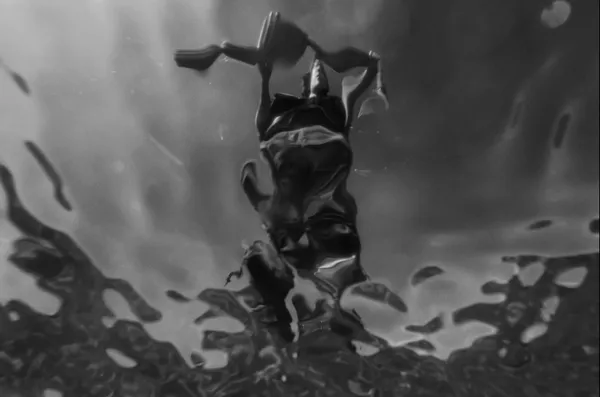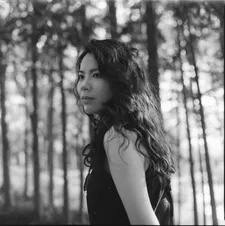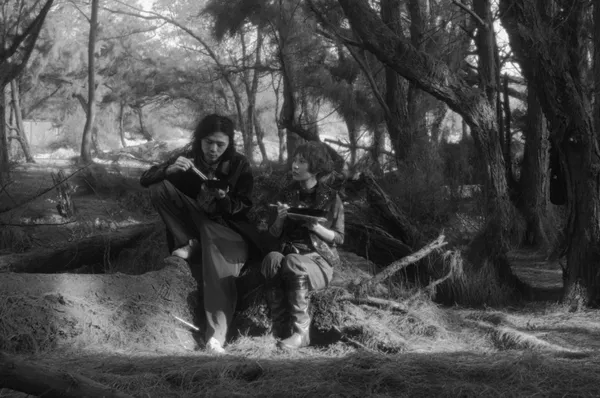 |
| Yihan Lin: 'A lot of times when I have a film idea, it often begins with my feelings about a certain space' |
From the real-life event of an art installation vanishing and her experiences as an assistant director for commercials, Yihan Lin intricately weaves a black-and-white short film that experiments with rich textures, time and nature. Sojourn to Shangri-La begins as an interesting take on meta-filmmaking and evolves into a mysterious journey that captivates viewers and encourages meditation. In this conversation with the Shanghai-based filmmaker, we discuss the origins of the short, which premiered at the Berlinale, how space influences her, what her time abroad has given her and the concept of her upcoming feature film.
The film takes a look behind the scenes of a film shoot. How did your personal experience shape the way you approached this short?
Yihan Lin: Two or three years ago, I graduated from film school and I worked for a commercial production company. Those commercial shootings usually take place in very dark studios in the suburbs of Shanghai. I worked as an assistant director and I particularly enjoyed those fleeting moments when I could walk out of the studio. I would relax watching amazing sunsets. But I felt that nobody in the studio would care about this view, and I had no one to share these feelings with. So there was a sense of detachment between the inside and outside. Between tranquil nature and the capital-driven human activities in the studio. And then, one of my friends, Mei, who later became the production designer for this short, told me about a strange event. She was working for a commercial and the art installation they had for the shooting vanished because of the high tide. After she told me about this event, I thought it resonated with my feelings. I was touched by the very subtle conflict within that moment.
Where did you film the short and what was it about the location that sparked your interest?
 |
| Yihan Lin |
YL: The film was shot in November 2022 in my hometown in Fujian province. Initially, we wanted to shoot in Shanghai because the true event was there, but that year, we encountered a lockdown because of the pandemic. So we went through a lot of trouble in pre-production. I had to go back home where I found this beautiful beach. I think because of the cultural context and rich religious background of my hometown I felt a sense of mystery. It inspired me a lot in terms of the revision of the plot. So we finally decided to shoot there.
It does feel like a spiritual experience, especially when the protagonist communicates with a villager through evocative sounds. How did you approach the sound design and what did you hope to convey in this moment?
YL: The main character enters this kind of wonderland, where normal language dissolves. We thought about the sounds that would represent them. And we thought about a phoenix for the main character. So we used whistles to create the sound of a bird, a phoenix. And for the villager, we thought he’s someone who’s rooted to the land. He’s a very ancient presence. So we thought about the element of wood. Then my sound designer just recorded the sound of a very old wooden door and used that to experiment. Going back to the location, it seems the protagonist has a strong connection to the space that surrounds her.
How closely does her attitude align with your filmmaking approach?
YL: Space influences me a lot. A lot of times when I have a film idea, it often begins with my feelings about a certain space. I think some film directors have influenced me to explore this aspect. For example, Michelangelo Antonioni. I think his approach to the interaction of character and landscape has shaped how I view film.
This interaction between your protagonist and space conveys a meditative nature to the short. What is it about this introspective filmmaking style that attracts you?
YL: I wanted to make this film look almost like an ancient documentary. As if later generations look at images of their ancestors. I was inspired by Chinese ancient travelogues. I wanted the film to feel that way, which is why I chose a black-and-white visual style that focuses a lot on raw textures. But I think the film blurs the line between ancient and modern elements. Because you also have very modern aspects in the film, such as the drone and the fashion.
When it comes to the drone, you employ it in a notably experimental manner. How did you approach those scenes?
YL: Usually in the commercial industry, the drone is used in a very smooth way. It's like a perfect machine. You can't feel any human within its basic use. But in this film, I think it's important for the drone to empower the protagonist. In the beginning, the drone is controlled by the drone operator. But then, she starts operating it and it becomes her point of view. She gains the ability to look back, or even gaze back at the crew.
With the current rise of artificial intelligence, I feel the drone sequence highlights how tools are elevated by artistic vision. How do you perceive the intersection between these technologies and creativity?
YL: Recently, I've also explored this aspect. I'm teaching a class and we are experimenting with AI. The students have to continue a short paragraph with three sentences and then we generate AI images based on what they write. And then maybe a short film. So we are exploring it. But I think it's a tool. And it depends on how you use it. And your emotional context when using it is also very important.
Speaking of education, could you elaborate on how your experience studying abroad influenced your filmmaking?
YL: In the beginning, I chose Columbia College Chicago because it focuses a lot on production. They teach teamwork and the way their industry approaches workflows. I think that's what I lacked in my undergraduate education because I didn't study filmmaking.
 |
| Yihan Lin: 'My films present a blurry depiction of space and time, something which I want to keep exploring in the future' |
Also, I think I gained a vision of what Western cinema is like. I think Western artistic films focus on the hidden emotions of people. But I also think there's a Western expectation for Chinese cinema to predominantly embody social and realist themes. Yet, my films present a blurry depiction of space and time, something which I want to keep exploring in the future.
You mentioned that directing wasn't your initial academic pursuit, having a background in design instead. The disappearing installation in the film caught my attention. Could you elaborate on how you envisioned it?
YL: It was designed by the production designer, who experienced the true event. But actually, the installation in her story is very different from this one. It is much more industrial, compared to ours, which is much more dreamy. She really infused her perspective into the remake and the translation of this new set piece. We talked about using a lot of elements from the sea. And also we wanted to capture the relationship between us and nature and even decentralise humans. So we used parts of the human image, like the braids you can see on the installation.
It seems to me that certain aspects of this short could transition into a feature film. Are you considering using any of its elements in long-form filmmaking?
YL: For me, a short film can tell a story very completely. How do you think Sojourn to Shangri-La can be developed into a feature?
I think it allows for a larger story perhaps involving a film crew with a pragmatic vision that contrasts the film's general dreaminess. It's just something I briefly considered. But I am curious If you see a path towards feature filmmaking. Is it something you pursue or are shorts your primary medium at the moment?
YL: I actually made this film to mark the end of my career in commercials. To reconcile with my past experience. I'm writing a feature right now. It is influenced by the story of a goddess from my hometown who protects women in childbirth. I want to adapt it to a contemporary setting.





















